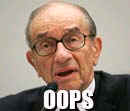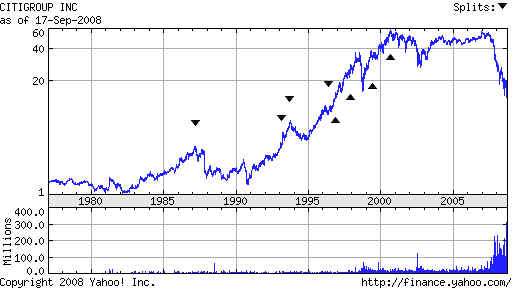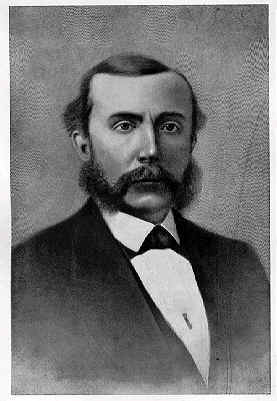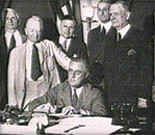
The
Greenspan "De-Regulation" of Banking,
by Abolishing The
Glass-Steagall Act of 1933
Directly Led to The
2007-2008 Bear Market.
by William Schmidt,
Ph.D.
Greenspan more than anyone else in Wall Street set the stage
for the terrible state
of finance
and business in September 2008. He did this by permitting a reckless housing
bubble and
avoiding review and regulation of banks and the housing market. Without
any
challenge or investigation, he sat back and permitted the heavily over-leveraged use
of all
manner of esoteric and opaque housing market instruments and mortgage derivatives.
These were
created by the commercial and investment banks to get rich quick. Instead,
it
has severely threatened the health of the American economy. These were the
institutions
the
Federal Reserve was supposed to regulate. Instead, the FED permitted zero-down
housing
loans! Greenspan's FED created a housing boom and bubble but walked away from
regulating it. He wore ideological blinders and simply wanted to make money for his
cronies on Wall Street. At first, he dogmatically espoused a highly ideological
stance of
de-regulation. Without legal authority, he created massive loopholes in the
Glass-Steagall
Act
which was enacted specifically to prevent commercial banks from getting into the business
of
buying and selling stocks or offering mortgage derivatives to investors. When
that was
accomplished, and then ratified ex post facto by Congress, he set forth on a course of
complete
non-regulation.
Greenspan Admits He Was Terribly Wrong
After the Crash of 2008, Greenspan finally admitted he had been wrong to favor
de-regulation
of
banks. On October 23, 2008, he admitted to Congress that he was wrong to have
trusted the
most
powerful bankers to act in their long run self-interest and that of their share
holders. He
explained:
"I made a mistake in presuming that the
self-interests of organizations,
specifically banks and others, were such as that they were best capable of protecting
their own shareholders and their equity in the firms."
What he should have said was
that multi-million dollar bonuses determined the
self-interests of Banking CEOs and Hedge Fund Managers. To make big short-term
profits,
they lied, obfuscated and hid the truth from investors and shareholders. They
recklessly used
leverage. They knowingly gave shareholders and creditors misleading financial
information
and
credit reports to exaggerate short-term profits and procure obscene bonuses for
themselves.
They
cared little about the consequences to millions whose life-savings and jobs were destroyed
in the process.
"What’s
remarkable about this is 
that
same erroneous belief is THE key pillar of all free market ideology. Without it,
the
entire edifice supporting the market worship fetish of the Libertarians, the Austrian
School, and most economists collapses into rubble, just as our financial system has
collapsed. It’s
hard to accept that economists could really believe such nonsense;
I suspect that much of their religious attitude toward markets stemmed from their
regular
paychecks from corporations benefiting from such dumb, unsupported beliefs."
(Blue and Red colors in the original for emphasis.
Stephen Zarlenga, American Monetary Insitute - http://www.monetary.org. )
SEC Chairman Cox Must Have Been in Cahoots with Bearish Hedge Funds
All Greenspan's surrendering to big banks was exactly matched by SEC Chariman Cox's
surrendering to big brokerages, hedge funds and mutual funds. Like Greenspan,
Cox
was driven by a mean mix of right-wing ideology and old-boys' cronyism. As a result,
Cox largely repudiated his charge, the regulation of the securities business. The
hen house
was always full of foxes with farmer Cox in charge. Under Cox, insider trading has
became rampant and common place. TigerSoft has documented many cases of this.
Under Cox.
all the New Deal restrictions on short selling and bear raiders were lifted with the same
dire
consequences for the stock market, business and jobs in America. TigerSoft has
documented
and decried this.
Ideological de-regulation and cronyism has made insiders rich, but impoverished
millions who were not in the loop and still don;t understand what happened to their money
or homes. Shame on Greenpan. Shame on Phil Graham. Shame on Robert Rubin.
And
shame on McCain and Obama for not talking about the need for the restoration of
Glass-Steagall.
Bank of America's September 2008 buy out of Merrill Lynch is
in complete
defiance of all that was learned by those who crafted Glass Steagall. It bodes
ill
for America. It is said that Bank of America drafted this Summer's
Emergency Housing Bill. BoA is now the nexus of American political, financial
and
economic power. Watch its stock. Its rise means democracy in America
is
declining. Predictably neither McCain nor Obama is saying a word to question
this
step back to the 1890s.
Federal Deposit Insurance Corporation (FDIC).
The arguments
for the
separation of commercial banking from brokerage and investment
banking can
be summarized:
1.The
granting of credit (lending) must be separated from the use of credit (investing).because
it
creates conflicts of interests and abuses.
2. Depository institutions possess enormous financial power, by virtue of their control of
other
people’s money. Those powers must be limited to ensure banking soundness and
competition
in the market for funds, whether loans or investments.
3. Securities activities are inherently risky and can and do sometimes lead to enormous
losses.
Such losses will surely threaten the integrity of deposits. In turn, the Government
insures deposits
and could be required to pay large sums if depository institutions were to collapse as the
result of
securities losses.
4. Depository institutions are supposed to be managed to limit risk. Their managers are
not
conditioned to operate prudently in more speculative securities businesses.
In the 1950s, Congress again put limits on commercial
banks and
prohibited them from owning insurance companies. They were not allowed
to
buy banks in another state. But then the tide started receding. In the
1960s
banks were allowed to enter the municipal bond field. And in the
1970s
some brokerages began to offer credit cards and check-writing.
Reagan, De-Regulation and One-Stop Banking
Starting in 1986, Reagan's Federal Reserve started picking apart the
Glass-Steagall Act. They re-interpreted Glass-Steagall as baring commercial
banks from being "principally engaged" in securities business, deciding that
banks can have up to 3% of their gross revenues from investment banking.
Previously, banks were not allowed to trade any equities.
In the Spring of 1987, Citigroup, JP Morgan and Bankers Trust pressure
the Federal Reserve to allow banks to handle several underwriting
businesses, including commercial paper, municipal revenue bonds, and
mortgage-backed securities. Chairman Volcker, who was
out-voted, was
not moved, and expressed "fear that lenders will recklessly lower loan
standards in pursuit of lucrative securities offerings and market bad loans
to the public". The Fed then said it would raise the limit on banks'
securities
revenue from 5% to 10 percent of gross revenues. In August 1987, Alan
Greenspan -- formerly a director of J.P. Morgan and a proponent of
banking deregulation -- became chairman of the Federal Reserve Board.
In January 1989, the Fed Board approves an application by J.P. Morgan,
Chase Manhattan, Bankers Trust, and Citicorp "to expand the Glass-Steagall
loophole to include dealing in debt and equity securities in addition to
municipal securities and commercial paper. This marks a large expansion of
the activities considered permissible under Glass-Steagall.
(Source: http://www.pbs.org/wgbh/pages/frontline/shows/wallstreet/weill/demise.html )
Greenspan De-Regulates without Congressional Action
In December 1996, with the support of Chairman Alan Greenspan, the
Federal Reserve Board issues a precedent-shattering decision permitting
bank holding companies to own investment bank affiliates with up to 25
percent of their business in securities underwriting (up from 10 percent).
This expansion of the loophole created by the Fed's 1987
reinterpretation of
Section 20 of Glass-Steagall effectively renders Glass-Steagall obsolete.
Virtually any bank holding company wanting to engage in securities business
would be able to stay under the 25 percent limit on revenue. Further, it
states that the risks of underwriting had proven to be "manageable," and
says banks would have the right to acquire securities firms outright.
"In 1997, Bankers Trust (now owned by Deutsche Bank) buys the
investment bank Alex. Brown & Co., becoming the first U.S. bank to
acquire a securities firm." The Fed allows it.
The Role of Citibank in the Demise of
Glass-Steagall
Quoted from PBS' Frontline.
| On April 6, 1998, Weill and Reed announce a $70 billion stock swap
merging Travelers (which owned the investment house Salomon Smith Barney) and Citicorp
(the parent of Citibank), to create Citigroup Inc., the world's largest financial services
company, in what was the biggest corporate merger in history. The transaction would have
to work around regulations in the Glass-Steagall and Bank Holding Company acts governing
the industry, which were implemented precisely to prevent this type of company: a
combination of insurance underwriting, securities underwriting, and commercial banking.
The merger effectively gives regulators and lawmakers three options: end these
restrictions, scuttle the deal, or force the merged company to cut back on its consumer
offerings by divesting any business that fails to comply with the law.
Weill meets with Alan Greenspan and other Federal Reserve officials before the
announcement to sound them out on the merger, and later tells the Washington Post
that Greenspan had indicated a "positive response." In their proposal, Weill and
Reed are careful to structure the merger so that it conforms to the precedents set by the
Fed in its interpretations of Glass-Steagall and the Bank Holding Company Act.
Unless Congress changed the laws and relaxed the restrictions, Citigroup would have two
years to divest itself of the Travelers insurance business (with the possibility of three
one-year extensions granted by the Fed) and any other part of the business that did not
conform with the regulations. Citigroup is prepared to make that promise on the assumption
that Congress would finally change the law -- something it had been trying to do for 20
years -- before the company would have to divest itself of anything.
Citicorp and Travelers quietly lobby banking regulators and government officials for
their support. In late March and early April, Weill makes three heads-up calls to
Washington: to Fed Chairman Greenspan, Treasury Secretary Robert Rubin, and President
Clinton. On April 5, the day before the announcement, Weill and Reed make a ceremonial
call on Clinton to brief him on the upcoming announcement.
The Fed gives its approval to the Citicorp-Travelers merger on Sept. 23. The Fed's
press release indicates that "the Board's approval is subject to the conditions that
Travelers and the combined organization, Citigroup, Inc., take all actions necessary to
conform the activities and investments of Travelers and all its subsidiaries to the
requirements of the Bank Holding Company Act in a manner acceptable to the Board,
including divestiture as necessary, within two years of consummation of the proposal. ...
The Board's approval also is subject to the condition that Travelers and Citigroup conform
the activities of its companies to the requirements of the Glass-Steagall Act."
Following the merger announcement on April 6, 1998, Weill immediately plunges into a
public-relations and lobbying campaign for the repeal of Glass-Steagall and passage of new
financial services legislation (what becomes the Financial Services Modernization Act of
1999). One week before the Citibank-Travelers deal was announced, Congress had shelved its
latest effort to repeal Glass-Steagall. Weill cranks up a new effort to revive bill.
Weill and Reed have to act quickly for both business and political reasons. Fears that
the necessary regulatory changes would not happen in time had caused the share prices of
both companies to fall. The House Republican leadership indicates that it wants to enact
the measure in the current session of Congress. While the Clinton administration generally
supported Glass-Steagall "modernization," but there are concerns that mid-term
elections in the fall could bring in Democrats less sympathetic to changing the laws.
In May 1998, the House passes legislation by a vote of 214 to 213 that allows for the
merging of banks, securities firms, and insurance companies into huge financial
conglomerates. And in September, the Senate Banking Committee votes 16-2 to approve a
compromise bank overhaul bill. Despite this new momentum, Congress is yet again unable to
pass final legislation before the end of its session.
As the push for new legislation heats up, lobbyists quip that raising the issue of
financial modernization really signals the start of a fresh round of political
fund-raising. Indeed, in the 1997-98 election cycle, the finance, insurance, and real
estate industries (known as the FIRE sector), spends more than $200 million on lobbying
and makes more than $150 million in political donations. Campaign contributions are
targeted to members of Congressional banking committees and other committees with direct
jurisdiction over financial services legislation.
After 12 attempts in 25 years, Congress finally repeals Glass-Steagall, rewarding
financial companies for more than 20 years and $300 million worth of lobbying efforts.
Supporters hail the change as the long-overdue demise of a Depression-era relic.
On Oct. 21, with the House-Senate conference committee deadlocked after marathon
negotiations, the main sticking point is partisan bickering over the bill's effect on the
Community Reinvestment Act, which sets rules for lending to poor communities. Sandy Weill
calls President Clinton in the evening to try to break the deadlock after Senator Phil
Grham, chairman of the Banking Committee, warned Citigroup lobbyist Roger Levy that Weill
has to get White House moving on the bill or he would shut down the House-Senate
conference. Serious negotiations resume, and a deal is announced at 2:45 a.m. on Oct. 22.
Whether Weill made any difference in precipitating a deal is unclear.
On Oct. 22, Weill and John Reed issue a statement congratulating Congress and President
Clinton, including 19 administration officials and lawmakers by name. The House and Senate
approve a final version of the bill on Nov. 4, and Clinton signs it into law later that
month.
Just days after the administration (including the Treasury Department) agrees to
support the repeal, Treasury Secretary Robert Rubin, the former co-chairman of a major
Wall Street investment bank, Goldman Sachs, raises eyebrows by accepting a top job at
Citigroup as Weill's chief lieutenant. The previous year, Weill had called Secretary Rubin
to give him advance notice of the upcoming merger announcement. When Weill told Rubin he
had some important news, the secretary reportedly quipped, "You're buying the
government?"
(Source: http://www.pbs.org/wgbh/pages/frontline/shows/wallstreet/weill/demise.html
) |
 |
|
In 1998, banking giant Citicorp was allowed to merge with Travelers
Insurance, which was also an investment giant. At the merger announcement,
Travelers CEO Sanford Weill appealed to Congress to undo the
Depression-era restrictions on banking in order to help American
financial companies compete overseas. (Source:
http://www.pbs.org/newshour/bb/business/july-dec99/bankreform_11-3.html )
On November 12, 1999, the key provision that prohibited banks from
owning financial companies was repealed by the Republican Party led by
Lindsay Graham. Gramm-Leach-Bliley Act President Clinton
signed the
bill
as part of his 1999 Budget Compromise with the de-regulatory Republican
Congress. He was heavily influenced by the self-serving advise of
his
Treasury Secretary, Robert Rubin.
See
The Media Moguls, the Bankers, and the CFR Rubin, it should be noted, went
back
to work for Citibank in 2001 and was marked as a key insider seller
by
TigerSoft in December 2007. Clinton would do what earlier Democrats
would
not: give bankers all but unlimited power, until their house of
cards
fell apart. Note that it cannot be said that Clinton's signature here made
Citibank. As you can see from the chart below, the 1990s' made that
bank.

Republicans after Lincoln have always worked for bankers. Read
about how much money Mark Hannah raised in 1896 to promote
trusts, combinations between bankers and industries like steel,
coal, copper and railroads.
| |

Mark Hannah, Republicans and Monopoly Trusts "The first class
of multimillionaires had made their fortunes in the Civil War, and during subsequent
decades they began to consolidate holdings in a number of industries with national and
international reach. Among the most famous were Carnegie Steel and John D. Rockefeller's
Standard Oil Company.
"The Sherman Anti-Trust Act, passed in 1890, was the first
important federal measure to limit the power of companies that controlled a high
percentage of market share. Ironically, in the 1890s the Act was used primarily to block
strikes, since it prevented any 'conspiracy to restrict trade,' and businesses like the
Pullman Railcar Company argued that labor unions were such conspiracies. They won the
support of state and federal militia to enforce this anti-labor view. At the same time,
the Supreme Court ruled in
1895 that many forms of business combination did not constitute "trusts" that
restrained interstate trade, and thus could not be prosecuted under federal law. The
Interstate Commerce Commission had been created, but it did not yet have the powers it
obtained in a later era, and critics considered it ineffectual.
"Antagonism toward "trusts" and
"monopolies" was wide-ranging. Critics of "The Trusts" often targeted
silver and gold mines in the West and other large companies whose employees faced
hazardous conditions and low wages. Others attacked "The Trusts" and "Wall
Street" in the same breath, identifying J. P. Morgan and other
financiers as the agents of industrial consolidation. In rural areas, the most dangerous
monopolies appeared to be the railroads, which controlled shipping rates along their
lines. Railroad magnates like Jay Gould and C. P. Huntington were among the targets of
free-silverites ire. Farmers also denounced grain elevators and speculators: the rise of
agricultural futures markets, accompanying mechanization of harvesting and processing,
caused many farmers to feel increasingly helpless in the face of large institutions beyond
their control. In short, denunciation of "The Trusts" symbolized broad fears
about the size and power of big business in America.
"Trusts also became a central issue in the
1896 campaign because of the fundraising activities of Mark Hanna and the Republican
National Committee. Hanna collected large sums from leading industrialists, most of whom
were terrified at the prospect of a Bryan victory. While such men opposed free silver, their fear of
pro-labor and anti-trust legislation probably played a greater role in inspiring their
donations. In calling attention to the connections between Republicans and industrialists,
Silver Democrats and other anti-McKinleyites were not exaggerating. The Republican
National Committee raised and spent (by its own accounting) at least $4,000,000 during the
campaign--a staggering sum for the day, assembled largely from major gifts by
industrialists and financiers. In addition, some of McKinley's allies, notably Whitelaw
Reid of New York, solicited J. P. Morgan's advice in drafting the financial planks of the
Republican platform."
Quoted from http://projects.vassar.edu/1896/trusts.html
|
The Republican-Banker alliance continues with full force with
Lindsay Graham, a long-time close economic advisor to Sen. McCain,
one
of the Senate's biggest bankers of convicted banker-swindler
Charles Keating. That's what makes such a joke McCain's 2008 campaign
promise that he is a maverick who will correct what ails the banking and
securities' industries.
The banking industry had been seeking the repeal of Glass-Steagall
since
at least the 1980's. Lindsay Graham was also responsible for the
de-regulation of energy futures in what has become known as the Enron
Amendment. This permitted Enron to artificially drive up energy prices
charged Californians in 2001 and allowed hedge fund speculators in 2007
and
2008 to drive up crude oil prices from 50 to 145.
The repeal of Glass-Steagall was "the keystone, that
provided non
transparent financial manipulation and use of leverage to revolutionize the
activities of investment beginning in 1999". It led to the amassing
of
"huge fortunes for the investment bankers who designed, marketed and
oversaw the use of leveraged investments". "The repeal enabled leverage
to be "conceived, deployed and expand, not only in the residential mortgage
sector, but (in) a host of other sectors as well, such as, municipal bonds, and
derivatives such as credit default swaps."
It naturally generated the
growth of highly speculative and unregulated hedge funds that often
whip prices of stocks up and down without any consideration being given
to the deleterious social costs caused, for example when energy prices
rapidly double or American business must lay off their workers and
close because of unscrupulous bear raiders who spread false and
negative rumors.
(Source: http://my.opera.com/richardinbellingham/blog/show.dml/1796860 )
Banks in this environment made mortgage loans en masse. Packaged
them as investment bankers and sold them as Grade AAA, even though
this was not true. With what they were paid for the mortgage packages,
they went out an made still more, lesser quality loans. In this way, they
built up their capital and very highly leveraged their net worth. The
Bush backed Carlye bond fund used 33 to 1 leverage. Its underlying
assets represented only 3% of its portfolio value. Even a small break in
housing prices and a small rise in delinquencies were thus able to bring it
down. Without regulation and transparency, there was every incentive for
an investment banker to espouse the view that the mortgages were
all sound. Now, we see the bundled mortgages are not safe. And without
transparency, private buyers avoid them. The Federal Government
is put in the position, by virtue of the dynamics of de-regulation, to be
last back-stop. This will easily cost it a trillion dollars over the next few
years. It will surely have to print much of this money, thus bringing all
the dire and attendant consequences runaway inflation brings.
"Robert Kutter (Stanford
University) testified before Barney Frank's
Committee on Banking and Financial Services in Oct 2007 " Since repeal
of Glass Stegall (FDR Banking Act) in 1999, after more than a decade of
de facto inroads, super banks have been able to re-enact the same kinds
of structural conflicts of interest that were endemic in the 1920s - tending
to speculators, packaging and securitizing credits and then selling them
off, wholesale or retail, and extracting fees at every step along the way.
And, much of this paper is even more opaque to bank examiners than its
counterparts were in the 1920s. Much of it isn't paper at all, and the whole
process is supercharged and automated formulas."
(Source: http://my.opera.com/richardinbellingham/blog/show.dml/1796860
)
How The Deal Was Made
Source: Judith Moriarty
writes in Foreclosures -
The Untold Story )
|
 TigerSoft
News Service 9/18/2008
www.tigersoft.com
TigerSoft
News Service 9/18/2008
www.tigersoft.com 




